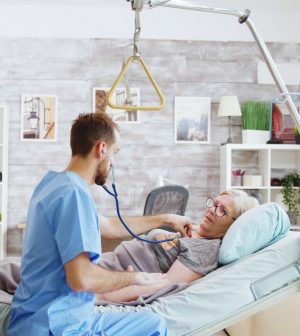- Could Your Grocery Store Meat Be Causing Recurring UTIs?
- Are You Making This Expensive Thermostat Error This Winter?
- Recognizing the Signs of Hypothyroidism
- 10 Strategies to Overcome Insomnia
- Could Artificial Sweeteners Be Aging the Brain Faster?
- Techniques for Soothing Your Nervous System
- Does the Water in Your House Smell Funny? Here’s Why
- Can a Daily Dose of Apple Cider Vinegar Actually Aid Weight Loss?
- 6 Health Beverages That Can Actually Spike Your Blood Sugar
- Treatment Options for Social Anxiety Disorder
Most Americans Would Welcome Hospital Care at Home, Survey Shows

Many Americans like the idea of receiving hospital-level care at home, believing they’d recover from their ills faster and without safety risks.
“Patients of course want the best-quality care, but often prefer to be at home, especially if technology allows them to work closely with their physician toward recovery,” said study leader Melissa Frasco, a research scientist at the University of Southern California (USC) Schaeffer Center.
The new study — published July 8 in the Journal of the American Medical Association — is an outgrowth of a pandemic-era trend.
As COVID-19 packed hospitals across the country, the U.S. Centers for Medicare & Medicaid Services temporarily authorized at-home care under a waiver that Congress extended through the end of this year. The extension included a requirement that CMS study the quality of at-home care. Congress is considering whether to approve reimbursements for hospital-at-home care over the long haul.
In all, 322 hospitals in 37 states are approved to provide at-home care.
For the study, researchers surveyed 1,100 participants in the university’s online Understanding America Study about their preferences.
In all, 47% called hospital-at-home care an acceptable alternative to inpatient care. Fewer than 1 in 5 had a negative view of it, while 36% were neutral.
Fifty-six percent of respondents agreed that people recover faster at home than in the hospital — and 21% strongly agreed.
Acceptability of at-home care was consistent across economic groups, health status, insurance coverage, prior hospitalizations or use of telehealth services, the study found.
“Our findings offer valuable information for policymakers and health systems as they navigate a new landscape of post-pandemic patient care,” said study co-author Erin Duffy, director of research training at the Schaeffer Center, said in a USC news release.
More information
There’s more about the benefits of telemedicine at Johns Hopkins Medicine.
SOURCE: University of Southern California, news release, July 8, 2024
Source: HealthDay
Copyright © 2026 HealthDay. All rights reserved.










